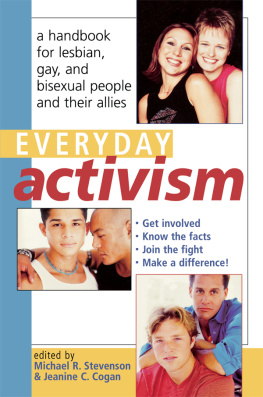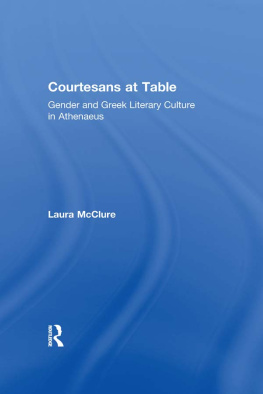Published in 2003 by
Routledge
29 West 35th Street
New York, NY 10001
www.routledge-ny.com
Published in Great Britain by
Routledge
11 New Fetter Lane
London EC4P 4EE
www.routledge.co.uk
Routledge is an imprint of the Taylor & Francis Group.
Copyright 2003 by Bernice L. Hausman
All rights reserved. No part of this book may be reprinted or reproduced or utilized in any form or by any electronic, mechanical or other means, now known or hereafter invented, including photocopying and recording or in any information storage or retrieval system, without permission in writing from the publisher.
Library of Congress Cataloging-in-Publication Data
Hausman, Bernice L.
Mother's milk: breastfeeding controversies in American culture / Bernice L. Hausman.
p. ; cm.
Includes bibliographical references and index.
ISBN 0-415-96656-6 (hbk. : alk. paper)ISBN 0-415-96657-4 (pbk. : alk. paper)
1. Breast feedingUnited States. 2. Breast feedingSocial aspectsUnited States. 3. LactationUnited States. 4. Mother and child.
[DNLM: 1. Breast FeedingUnited StatesPopular Works. 2. LactationUnited StatesPopular Works. 3. Mother-Child RelationsUnited StatesPopular Works.
WS 125 H376m 2003] I. Title.
RJ216.H28 2003
| 613.2690973dc21 | 2002156321 |
For
Rachel and Sam,
who taught me how
Dirt had entered. There was now an abscess. He might have to operate. In any case the child in the future would have to seek its nourishment in tins.
What? exclaimed Herr Dremmel.
Tins, said the doctor.
Tins? For my son? When there are cows in the world? Cows, which at least more closely resemble mothers than tins?
Tins, repeated the doctor firmly. Herr Pastor, cows have moods just as frequently as women. They are fed unwisely, and behold immediately have a mood. Not having the gift of tongues they cannot convey their mood by speech, and baffled at one end they fall back upon the other, and express their malignancies in milk.
Elizabeth von Arnim, The Pastors Wife
She was doing the most natural thing in the world, suckling her young, and for some peculiar reason it was completely unnatural, strained, and false, like a posed photograph. Everyone in the hospital knew this, her mother knew it, her visitors knew it; that was why they were all talking about her nursing and pretending that it was exciting, when it was not, except as a thing to talk about. In reality, what she had been doing was horrid, and right now, in the nursery, a babys voice was rising to tell her sothe voice, in fact, that she had been refusing to listen to, though she had heard it for at least a week. It was making a natural request, in this day and age; it was asking for a bottle.
Mary McCarthy, The Group
Mothers Milk: Breastfeeding Controversies in American Culture is a book for physicians and other medical professionals, feminist health activists, breastfeeding advocates, feminist body theorists, and cultural studies scholars in general. It is also, I hope, a book for mothers who seek to understand the cultural influences on their maternal practices. But it is not only a book for those interested in maternity, or even, oddly, breastfeeding. Just as in my first book, I argue here that feminist and cultural studies scholars must interrogate biomedical discourses about embodied sex. There, I wrote that in a critical return to sex we may find a way to destabilize gender as a normalizing narrative in the twentieth century (200). The scientific case for breastfeeding is nothing if not a biomedical discourse about embodied sex, and I argue here that we must confront this discourse for its perpetuation of discriminatory views of women, as well as use it to challenge current social practices that work to subordinate mothers choices and actions. Breastfeeding as an act is no panacea for the subordination of women, but an examination of breastfeeding uncovers central feminist tensions around the meaning of womens bodies, the authority of science, and the social value of maternity in contemporary culture.
I write this book as a mother, breastfeeding advocate, and feminist theorist. Often, those identity positions conflict; writing this book has been an attempt to make them cohere, or at least to become clearer about the contradictions that arise in articulating all three in close relation. Mothers Milk is a book that emerges from certain experiences I have had as a breastfeeding mother, but it is not a book that depends on personal reflection. I have tried to link some aspect of each chapter to my own practices or thoughts as a mother, but only in order to ground what I consider a theoretical consideration of embodied maternity in the more mundane experiences of contemporary American middle-class motherhood. Indeed, much of the reflecting that I do about my own experiences in this book has as its purpose the grounding of those thoughts in the specificity of my own position as a middle-class white woman and professional worker. In this way I hope to be better able to identify differences in other womens experiences of breastfeeding, breastfeeding advocacy, and the medical institution.
I want Mothers Milk to reach beyond scholarly audiences to convince nonacademic readers about the significance of cultural inquiry and the importance of sustained attention to the way that medicine influences our experience of our bodies and of our social relationships. In the United States, we are bombarded daily with new information about health and the preferred practices with which we can improve our bodies and those of our children. At the same time, we are subject to an avalanche of stories about emerging health risks. For example, during the fall of 2002, as I am preparing this manuscript for publication, West Nile virus has been found in breast milk. This information follows on the discovery that West Nile virus can be passed on through donated blood and organs, and echoes current debates over HIV infection via breastfeeding. The question of whether an infant can contract the virus through its mothers milk has not been answered, but the headline West Nile Virus Found in Breast Milk heralds a new risk in the increasingly common perception that toxins make their way from mother to baby through intra- and extra-uterine means.
Breast milk has apparently been a conduit for human viruses for millenniabreastfeeding is not a new mechanism for viral transfer. But the risk, at least in the United States, appears more salient, given recent and fervent public health campaigns to increase rates of maternal nursing and given the apparent relative safety of infant formula as a substitute for breast milk (in the developed world). Yet these kinds of stories about breaking medical news raise a host of questions. How are mothers to make informed decisions about breast- or bottle feeding when the risks of both practices are difficult to identify and assess? How do laypeople interpret medical information, especially since so much of it is conveyed through media sources or advice literature? What are the cultural meanings attached to both breast- and bottle feeding that affect mothers choices? How do economic circumstances influence feeding practices and maternal embodiment, as well as the familial decisions about infant care that seem to affect them?
Mothers Milk




